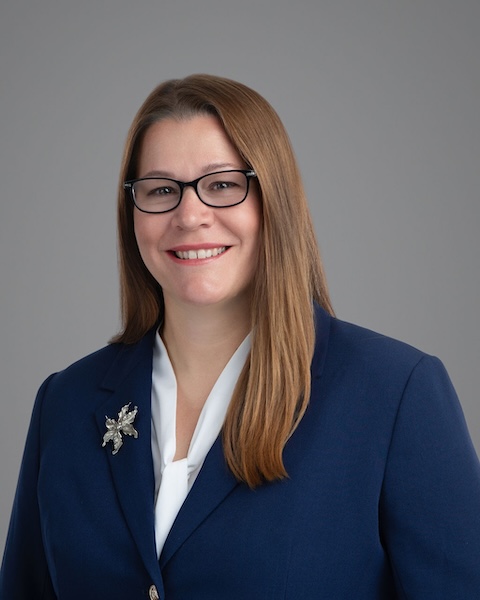An Interview with Our New Director of Contests: Amanda Beecher, Ph.D.
We’re excited to introduce Dr. Amanda Beecher as COMAP’s new Director of Contests and Outreach. A dedicated mathematical modeling educator, Dr. Beecher has built her career on enhancing educational experiences by connecting mathematics to real-world challenges.

Before joining COMAP, she spent 15 years at Ramapo College of New Jersey, where she was a Professor of Mathematics, the founding department head of the Data Science undergraduate program, and Program Director of the Master’s in Applied Mathematics program. She earned her Ph.D. in mathematics from the University at Albany, SUNY, and completed a three-year postdoctoral fellowship at the U.S. Military Academy at West Point — an experience that first sparked her passion for applied mathematics and modeling.
In this interview, Dr. Beecher shares her journey with math modeling, her excitement for her new role at COMAP, and her vision for contests that continue to engage, challenge, and inspire students worldwide.
Can you share a little about your background and what brought you to COMAP?
Nearly all of my applied mathematics and modeling experiences began at the United States Military Academy at West Point, where I was a postdoctoral visiting faculty member in the Department of Mathematical Sciences. During my first semester, I taught my first mathematical modeling course and also became involved with COMAP. In 2007, I served as a team advisor for the MCM and as a triage judge for the ICM. This was a tremendous opportunity for me to deepen my understanding of mathematical modeling while supporting students and colleagues.
Since then, my role with the ICM grew from triage judge to problem author, problem lead, Director of the ICM, and eventually Director of Undergraduate Contests at COMAP. Each step gave me the chance to learn from talented colleagues and to contribute to the growth of the contests. The work has always been fun and rewarding, in large part because of the people, including the COMAP team, the judges, and the broader modeling community. Every year, I look forward to final judging, not just for the mathematics, but for the chance to reconnect with so many of my math modeling friends.
What first drew you to contests like the MCM and ICM?
What struck me most about the contest was the energy and excitement of the students. Over that long weekend, they were fully engaged and thrilled to contribute meaningfully to real-world problems using the skills they already had. The first MCM team earned a Meritorious designation. Their success came not from any special preparation on my part, but from their ability to collaborate, think creatively, and push themselves as a team. I had never seen mathematics presented in such an exciting and practical way before. The students were hooked, and so was I.
In judging, I was also impressed by the submissions of the teams to address such difficult problems in only four days. They were able to define the problem, develop an approach, and communicate their findings in a professional product that would have taken me much longer to complete. Experiencing the contest from both perspectives—advisor and judge—was thrilling and made clear the incredible benefits it provides to students. From that point on, I knew I wanted to be more involved.
Can you share an example of how participating in modeling contests has impacted your students?
After three rewarding years advising teams at West Point, I was eager to bring the same opportunities to students at Ramapo College. We started small, with a team of three who competed in a 24-hour modeling challenge. I remember one student in particular who recognized that no data set is ever “perfect.” He was challenged at how best to balance available resources with the desire for more complete answers. That conversation became a valuable lesson for everyone that good solutions aren’t always perfect solutions, and learning how to evaluate trade-offs is a vital part of the modeling process.
That student went on to compete in the MCM/ICM for three years, each time stepping up as the leader of his team and consistently earning a Meritorious designation. He even published a reflection on his first-year experience in The UMAP Journal. Watching his growth, and the growth of so many students through modeling, reinforced my belief in the power of these contests to transform the way students see mathematics and its utility.
How did you carry that passion for math modeling into your own classrooms?
One of the most direct ways to bring modeling into the classroom is by developing and offering dedicated mathematical modeling courses at the general education, mathematics major, and graduate levels. For example, I taught Introduction to Mathematical Modeling in our general education program, which attracted students interested in applied mathematics and problem solving. For many, it was their first experience wrestling with real-world, open-ended problems and applying their mathematical knowledge in new and creative ways.
I also designed a Topics in Mathematical Modeling course for mathematics and computer science students. Years later, I still hear from alumni about the impact it had—helping them apply mathematical thinking in their careers, whether in the tech industry or in education. More recently, I developed a graduate-level course in Advanced Mathematical Modeling for our Master’s in Data Science program. Employers consistently tell me that while technical skills are important, the real differentiator is the ability to think critically about assumptions, limitations, and implications of solutions. Asking questions like: When does this work? Where can improvements be made? How good is this solution for our purposes?, is precisely the type of thinking fostered through the modeling process.
In addition to creating new courses, I have also integrated mathematical modeling units into existing courses by using past MCM/ICM contest problems or COMAP modules. These provide ready-to-use, authentic problems that bring modeling directly into the classroom, giving students valuable opportunities to experience mathematics as dynamic, applicable, and meaningful.
As COMAP’s new Director of Contests and Outreach, what will your role include?
In my role as Director of Contests and Outreach, I will oversee the logistical aspects of COMAP’s contests and support our contest directors to ensure that teams have the best possible contest experience. I am also excited to expand our outreach efforts and connect with the broader mathematical modeling community. This includes supporting the teachers and advisors who play such a critical role in guiding and inspiring students, and strengthening the network of educators and professionals who make these experiences possible. I look forward to building awareness of the contests and engaging students who may not yet be involved, but who can benefit greatly from the opportunities these experiences provide.
Why do you think contests like COMAP’s are so valuable for students and educators?
I have enjoyed witnessing the impact that the MCM and ICM contests have on my own students. One of the most valuable aspects of these contests is that they give students the chance to work on authentic, real-world problems. Through this process, they learn that perfection is rarely possible and that a “good” solution, thoughtfully constructed, can be incredibly powerful. They also learn how to ask the right questions, to recognize the limitations of their solutions, and to reflect critically on their work.
These lessons don’t always happen inside the classroom, which makes the contests such a meaningful complement to students’ education. Employers have shared with me how much they value the kind of thinking these contests require, including the ability to clearly state and evaluate assumptions and approach open-ended problems with creativity and precision. Giving students the opportunity to practice these skills, enhance their abilities, and see mathematics as valuable and applicable has been one of the most rewarding aspects of my work.
I look forward to hearing and sharing more stories about how these contests transform classrooms and inspire young mathematicians.
If you had to sum up COMAP contests in three words, what would they be?
If I had to sum up the COMAP contests in three words, they would be engaging, challenging, and rewarding. The problems are engaging because they connect to real-world issues that future employers and college admissions counselors can immediately recognize as meaningful. They are challenging because they push students to think deeply, to leverage the mathematics they know, and to apply it creatively and quantitatively to complex situations. And, most of all, the contests are rewarding. Beyond working as a team to meet a deadline, students experience the joy that comes from tackling a difficult problem and discovering that they can create a solution. Showcasing the power of their own mathematical abilities is a reward that stays with them long after the contest ends.
Any closing thoughts as you step into this new role?
Overall, I have been fortunate to work on contests and COMAP projects throughout my career, and I have continually drawn on the knowledge, resources, and relationships I’ve built through these experiences. The ideals of authentic problem solving, collaboration, and making mathematics meaningful, fostered by COMAP, have deeply influenced my own philosophy of mathematics modeling education. I am truly excited to join this outstanding group of colleagues and to continue expanding access to mathematical modeling experiences for students and educators everywhere.
Dr. Beecher’s enthusiasm and experience are already shaping the future of COMAP contests. With her leadership, we look forward to seeing more students discover the power of mathematics to solve real-world problems and to inspire the next generation of problem solvers.
Learn more about COMAP's math modeling contests.
Written by
COMAP
The Consortium for Mathematics and Its Applications is an award-winning non-profit organization whose mission is to improve mathematics education for students of all ages. Since 1980, COMAP has worked with teachers, students, and business people to create learning environments where mathematics is used to investigate and model real issues in our world.
